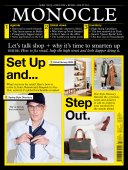
Issue 162
What’s in store for retail? Monocle’s Retail Survey checks out the global benchmarks in shopping, while our spring Style Directory rounds up the labels, designers and products on the radar of the sharpest dressers. Elsewhere, we go in-depth on the mystery of who blew up Nord Stream and reveal Paris’s best sandwich – and how to make it.
In This Issue
Oops! No content was found.
Looks like we no longer have content for the page you're on. Perhaps try a search?
Return Home

